It looks like you're using an Ad Blocker.
Please white-list or disable AboveTopSecret.com in your ad-blocking tool.
Thank you.
Some features of ATS will be disabled while you continue to use an ad-blocker.
Earthquake Predictions, Magnitude ~ 8 Around 26 October 2011, Gravitational Force of Moon, Supermoon
page: 2share:
Here is some new interesting info what I find today ..
March 09, 2011 , 11:12 AM
On ABC Melbourne 2 days before Japan earthquake he say very clear supermoon from 19 March can trigger strong earthquake ..
I think similar like him any supermoon can trigger very strong earthquake, but we have more reasons for that situation what need to be monitoring ..
Supermon - new moon gravitation force on Earth are on same side with Moon and Sun, full supermon they are on opposite side of Earth like gravitation force too ..
Both lined up in supermoon (closes to earth) have maximum gravitation pressure on Earth but want to understood more which have more influence on tectonic plate pressure ..
Here is interview ..
blogs.abc.net.au...
www.astropro.com...
The Phases of the Moon
March 09, 2011 , 11:12 AM
On ABC Melbourne 2 days before Japan earthquake he say very clear supermoon from 19 March can trigger strong earthquake ..
I think similar like him any supermoon can trigger very strong earthquake, but we have more reasons for that situation what need to be monitoring ..
Supermon - new moon gravitation force on Earth are on same side with Moon and Sun, full supermon they are on opposite side of Earth like gravitation force too ..
Both lined up in supermoon (closes to earth) have maximum gravitation pressure on Earth but want to understood more which have more influence on tectonic plate pressure ..
Here is interview ..
blogs.abc.net.au...
www.astropro.com...
The Phases of the Moon
Dec 12 2004 21:31 357985 km N+ 20h to
Jan 10 2005 10:08 356571 km -- N- 1h
2004 Dec 26 15:07 be 100 % full moon ..
www.fourmilab.ch...
Deadliest Tsunami in History
December 26 2004 ..
news.nationalgeographic.com...
This video is heartbreaking because two day after that happen catastrophic earthquake and tsunami in Japan ..
Jan 10 2005 10:08 356571 km -- N- 1h
2004 Dec 26 15:07 be 100 % full moon ..
www.fourmilab.ch...
Deadliest Tsunami in History
December 26 2004 ..
news.nationalgeographic.com...
This video is heartbreaking because two day after that happen catastrophic earthquake and tsunami in Japan ..
edit on 16-10-2011 by Dalke07 because: (no reason given)
The period of the 26-31 should be quite interesting, it seems that some sort of major disasters or other world changing events of some sort will occur
during this time. not sure what exactly though.
Originally posted by oxbow
The Japan earthquake occurred on 11 March. The supermoon was on 19 March. There is no correlation between supermoons and large earthquakes.
I think you hit the nail right on the head. There is no correlation.
there seems to be a correlation between the moons perigee and apogee, I believe from the 10 days before perigee we can see this. I started to notice
this just before the japan quake.
here is a thread i made just before this last supermoon in march you might find interesting.
Extreme Super Moon & Current Rise in sun Activity: Effects on earth
your theory dalke07 is understandable but I think you or I are missing one point and that is the closest perigee compared to what.
the closest perigee this last year in march was 356577 km from earth. this coming perigee you are warning of will be 357050 km so we shall see if anything comes of this there is a big difference, though it is the 2nd closest perigee of this year so we may see a rise in activity just not as large as we saw the 10days before last march's perigee..
personally if anything occurs it will be moderate and not easily noticed the date I am more looking towards is the perigee of May 6 2012 3:34 at a distance of 356953 km.
the sun and moon are always effecting the earth therefore I don't see much more effect when there is a full moon.
I think there is more effect in the constant movement of the moon from apogee to perigee that has the most tidal effect on our earths water and magma which makes up a large amount of our earth and the human body, then ads stress to the plates and fault lines.
here is a thread i made just before this last supermoon in march you might find interesting.
Extreme Super Moon & Current Rise in sun Activity: Effects on earth
your theory dalke07 is understandable but I think you or I are missing one point and that is the closest perigee compared to what.
the closest perigee this last year in march was 356577 km from earth. this coming perigee you are warning of will be 357050 km so we shall see if anything comes of this there is a big difference, though it is the 2nd closest perigee of this year so we may see a rise in activity just not as large as we saw the 10days before last march's perigee..
personally if anything occurs it will be moderate and not easily noticed the date I am more looking towards is the perigee of May 6 2012 3:34 at a distance of 356953 km.
the sun and moon are always effecting the earth therefore I don't see much more effect when there is a full moon.
I think there is more effect in the constant movement of the moon from apogee to perigee that has the most tidal effect on our earths water and magma which makes up a large amount of our earth and the human body, then ads stress to the plates and fault lines.
edit on 10/16/2011 by -W1LL because: sp
reply to post by -W1LL
First time see your thread and I like it very mach, thank you for that and for posting your option ..
Distance Earth-Moon of each supermoon are similar close enough to trigger stronger earthquake, that's how I think ..
For my is more important some other things like horizontal line of Moon/Sun pressure in that 30 days when appears supermoon, present situation of magma movement and pressure, recant earthquakes activity in that line in connection with this tectonic plates or instability of both etc ..
We have many options and reasons ..
Of course it is important that extra closes distance and have more effect on tectonic plate but if that theory correct what you say we have same situation in every 14 extreme supermoons from 1900 to the present date ..
Last extreme supemoon was 1993, no stronger earthquake or tsunami in that 30 days ..
Mar 8 1993 8:36 356529 km ++ F- 1h
earthquake.usgs.gov...
Very detailed picture of tectonic plates ..
upload.wikimedia.org...
List of tectonic plates
Peace ..
First time see your thread and I like it very mach, thank you for that and for posting your option ..
Distance Earth-Moon of each supermoon are similar close enough to trigger stronger earthquake, that's how I think ..
For my is more important some other things like horizontal line of Moon/Sun pressure in that 30 days when appears supermoon, present situation of magma movement and pressure, recant earthquakes activity in that line in connection with this tectonic plates or instability of both etc ..
We have many options and reasons ..
Of course it is important that extra closes distance and have more effect on tectonic plate but if that theory correct what you say we have same situation in every 14 extreme supermoons from 1900 to the present date ..
Last extreme supemoon was 1993, no stronger earthquake or tsunami in that 30 days ..
Mar 8 1993 8:36 356529 km ++ F- 1h
earthquake.usgs.gov...
Very detailed picture of tectonic plates ..
upload.wikimedia.org...
List of tectonic plates
Peace ..
edit on 17-10-2011 by Dalke07 because: (no reason given)
Thank you for posting another "prediction" which will undoubtedly fail.
G'day to you.
G'day to you.
Some member asked for "real evidence", lo0l ..
Think he have in mind some "science" paper ..
Strong Earth Tides Can Trigger Earthquakes, UCLA Scientists Report
ScienceDaily (Oct. 22, 2004) — Earthquakes can be triggered by the Earth's tides, UCLA scientists confirmed Oct. 21 in Science Express, the online journal of Science. Earth tides are produced by the gravitational pull of the moon and the sun on the Earth, causing the ocean's waters to slosh, which in turn raise and lower stress on faults roughly twice a day. Scientists have wondered about the effects of Earth tides for more than 100 years. (The research will be published in the print version of Science in November.)
www.sciencedaily.com...
www.sciencemag.org...
Think he have in mind some "science" paper ..
Strong Earth Tides Can Trigger Earthquakes, UCLA Scientists Report
ScienceDaily (Oct. 22, 2004) — Earthquakes can be triggered by the Earth's tides, UCLA scientists confirmed Oct. 21 in Science Express, the online journal of Science. Earth tides are produced by the gravitational pull of the moon and the sun on the Earth, causing the ocean's waters to slosh, which in turn raise and lower stress on faults roughly twice a day. Scientists have wondered about the effects of Earth tides for more than 100 years. (The research will be published in the print version of Science in November.)
Large tides have a significant effect in triggering earthquakes," said Elizabeth Cochran, a UCLA graduate student in Earth and space sciences and lead author of the Science paper. "The earthquakes would have happened anyway, but they can be pushed sooner or later by the stress fluctuations of the tides."
"Scientists have long suspected the tides played a role, but no one has been able to prove that for earthquakes worldwide until now," said John Vidale, UCLA professor of Earth and space sciences, interim director of UCLA's Institute of Geophysics and Planetary Physics, and co-author of the paper. "Earthquakes have shown such clear correlations in only a few special settings, such as just below the sea-floor or near volcanoes."
www.sciencedaily.com...
www.sciencemag.org...
edit on
17-10-2011 by Dalke07 because: (no reason given)
Next reason is planetary alignments in that days, some medium influence they have too because is not to big alignment ..
Planetary alignments for my have influence for bigger earthquake too and Sun stronger activity ..
Saturn and Jupiter when they are on opposite sides or in conjunction find some bigger earthquakes in history in that months ..
They be on 10.March on opposite sides and we have strong planetary alignments too ..
They will be on same sides 2020 and next opposite side in 2030 ..
Sun go very active from first days of March to 11.03 ..
I think it be around M 7.8 in ocean if happen, hope it be M 6 ..
Here some videos what I find on you-tube ..
Planetary Alignment / Earthquake Watch Oct 26th 2011
Earthquake and Planetary Watch Oct 26 - Nov 10, 2011
Earthquakes and the Conjunction of the sun and Jupiter
Planetary alignments for my have influence for bigger earthquake too and Sun stronger activity ..
Saturn and Jupiter when they are on opposite sides or in conjunction find some bigger earthquakes in history in that months ..
They be on 10.March on opposite sides and we have strong planetary alignments too ..
They will be on same sides 2020 and next opposite side in 2030 ..
Sun go very active from first days of March to 11.03 ..
I think it be around M 7.8 in ocean if happen, hope it be M 6 ..
Here some videos what I find on you-tube ..
Planetary Alignment / Earthquake Watch Oct 26th 2011
Earthquake and Planetary Watch Oct 26 - Nov 10, 2011
Earthquakes and the Conjunction of the sun and Jupiter
edit on 17-10-2011 by Dalke07 because: (no reason given)
Some stellarium images ..
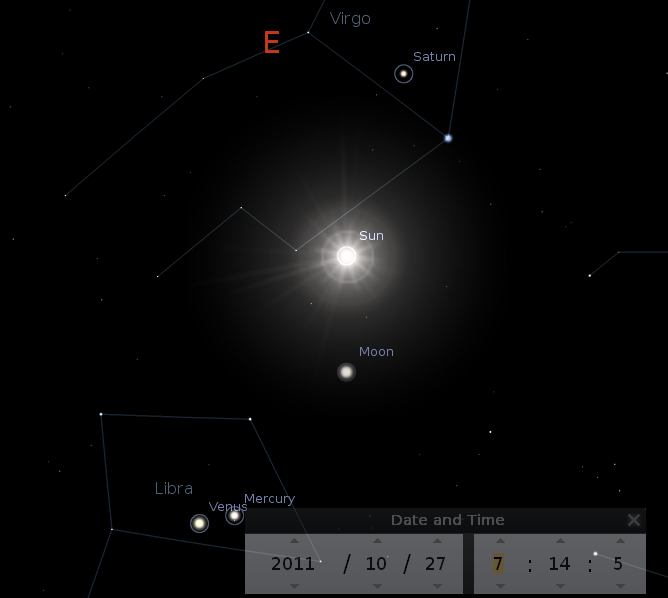
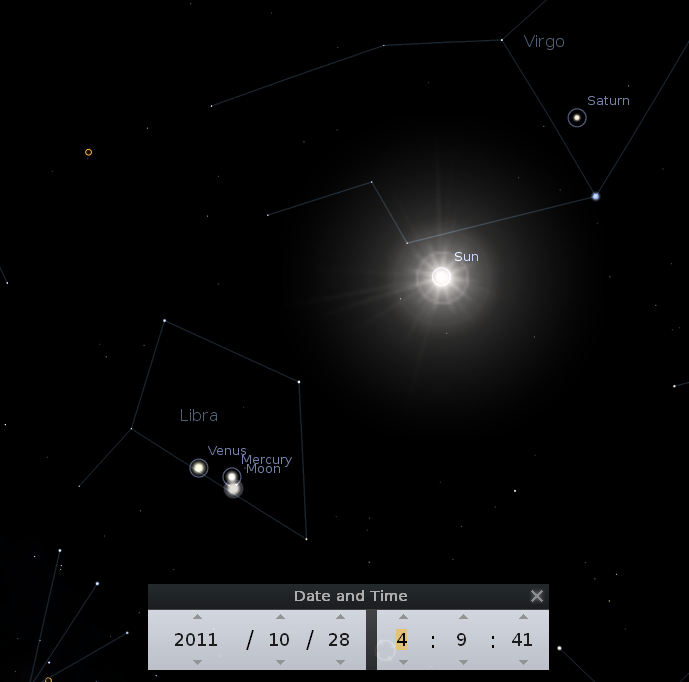
Sun was very angry from 5 March to 11 March ..
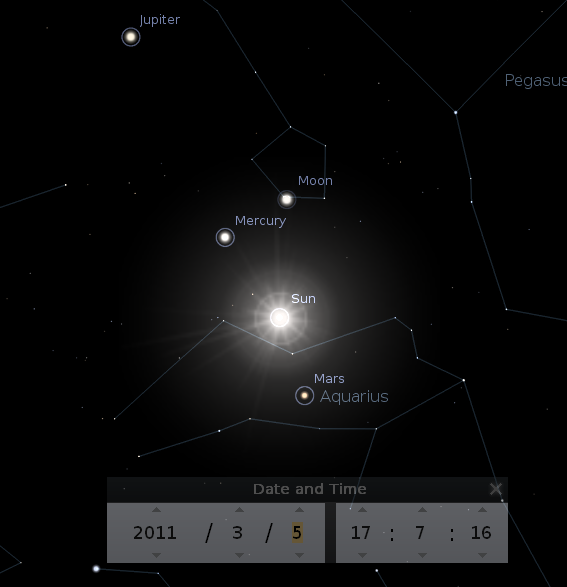
Some Sun activity in planetary alignment ..


Sun was very angry from 5 March to 11 March ..

Some Sun activity in planetary alignment ..
edit on 17-10-2011 by Dalke07 because: (no reason given)
Okay, I will mark on my calendar. The predictions and such are quite interesting to me because science is getting closer all the time to understanding
the earth but I still am unsure if science can predict the Earth because IMO nature is unpredictable.
Venus transit 2012
www.december212012.com...
2012codex.com...
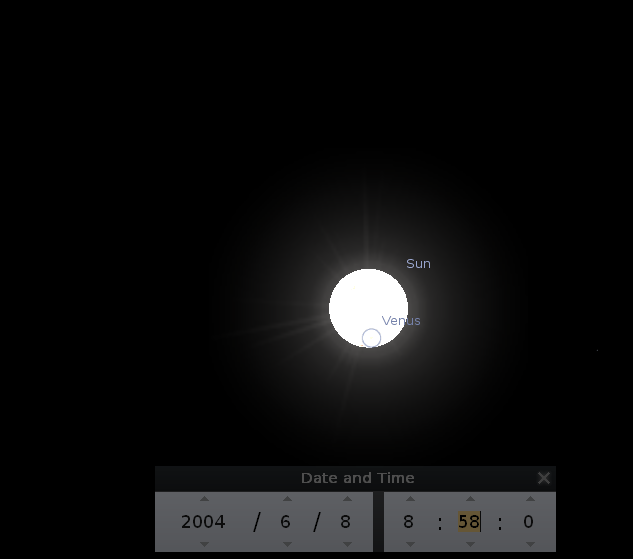
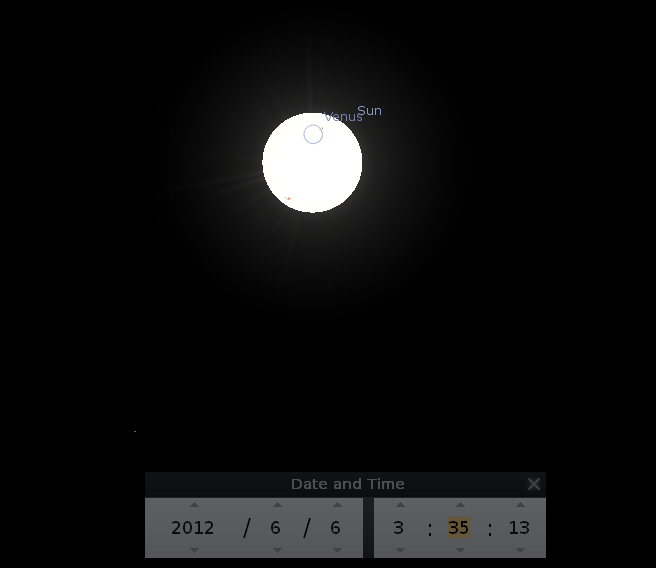
Very big possibility for movement of tectonic plates and strong earthquake in this days ..
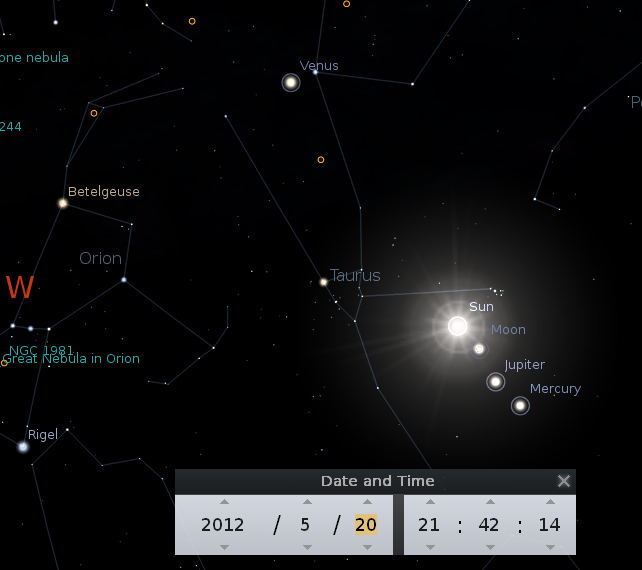
Very strong Sun activity to March 11 when very powerful geomagnetic storm make movement and pressure on tectonic plate ..
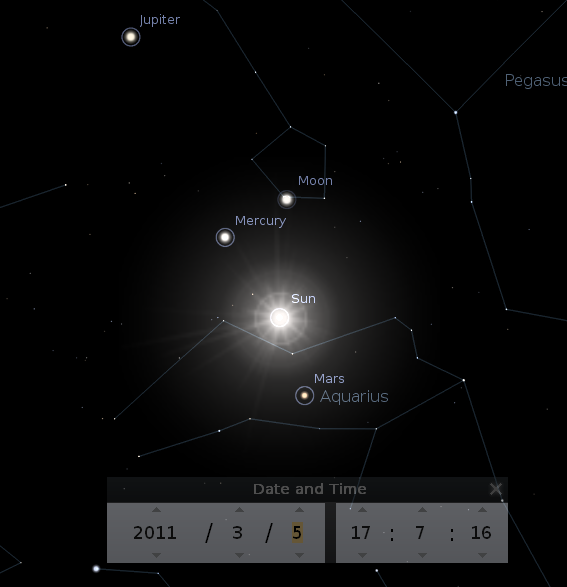
May 22, 1960 Valdivia, Chile 1960 Valdivia earthquake 9.5
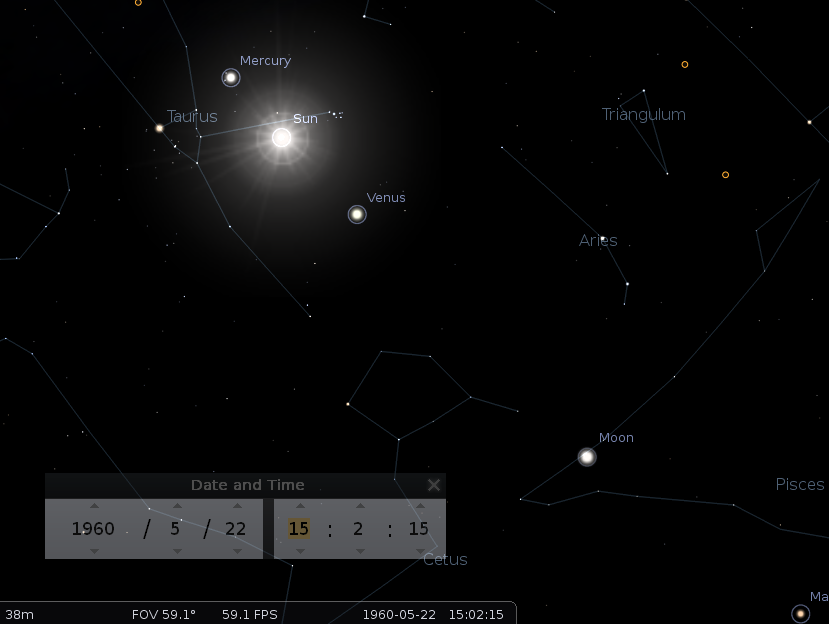
February 27, 2010 Maule, Chile 2010 Chile earthquake 8.8
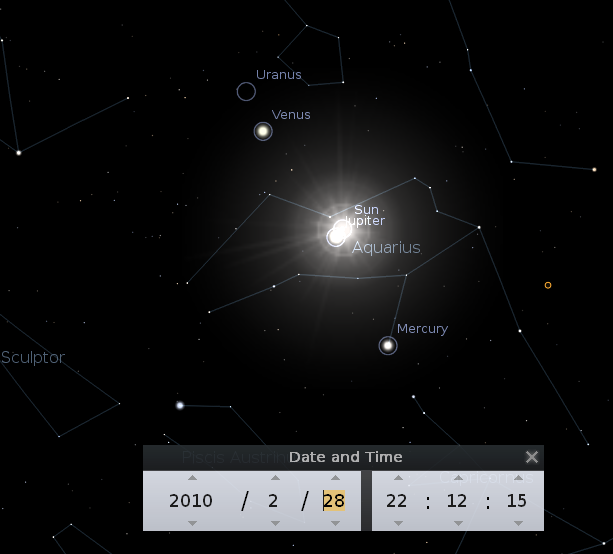
January 26, 1700 Pacific Ocean, USA and Canada 1700 Cascadia earthquake 8.7–9.2 (est.)
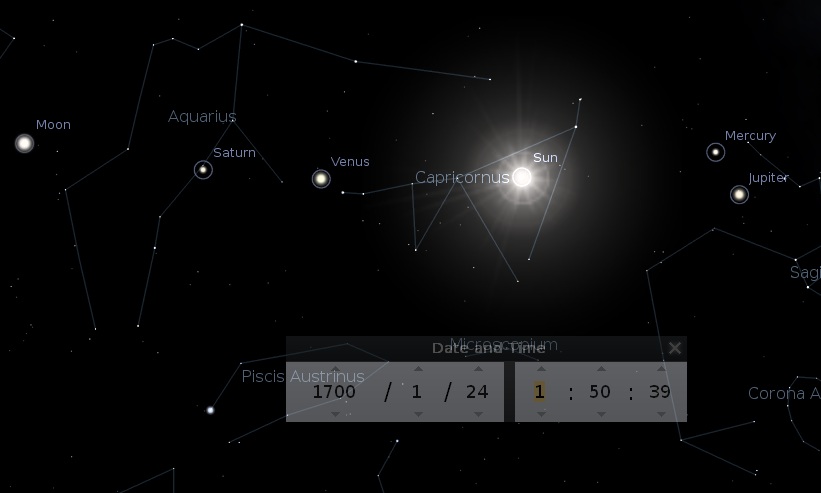
www.december212012.com...
2012codex.com...


Very big possibility for movement of tectonic plates and strong earthquake in this days ..

Very strong Sun activity to March 11 when very powerful geomagnetic storm make movement and pressure on tectonic plate ..

May 22, 1960 Valdivia, Chile 1960 Valdivia earthquake 9.5

February 27, 2010 Maule, Chile 2010 Chile earthquake 8.8

January 26, 1700 Pacific Ocean, USA and Canada 1700 Cascadia earthquake 8.7–9.2 (est.)

edit on 17-10-2011 by Dalke07 because: (no reason given)
This is prediction for next year for dangerous earthquake and volcano activities ..
For my alignment of Jupiter, Earth and Sun have most influence on tectonic plates of all other alignments ..
Supermoons and group planetary alignments too ..
Earth will be between Sun and Jupiter on 29 October 2011, new supermoon on 26.October ..
Probably we have in ocean around 7.7 M ..
November is dangerous too but not like end of October ..
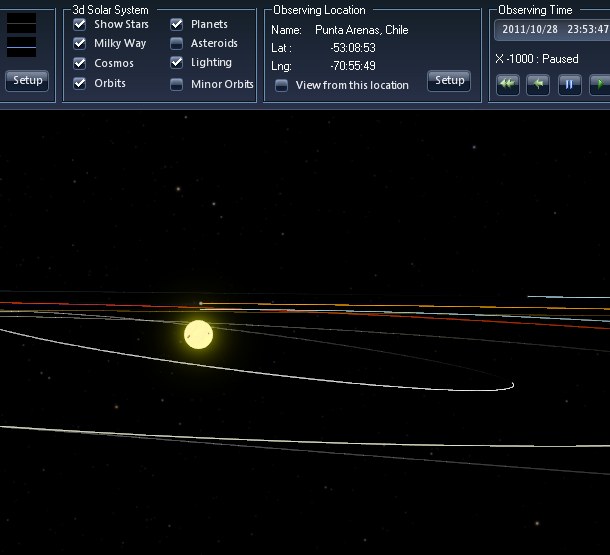
For 2012 year most dangerous time for tectonic plates movement are from Jupiter alignment to Venus transit and full supermoon from May 6 ..
From 1 May to 10 June 2012, think we have big volcano eruptions or very strong earthquake M 8.2+ very possible ..
May 6 3:34 356953 km ++ F- 0h
www.fourmilab.ch...
December of 2012 dangerous for 7.5 +, Earth is closes to Sun every year in end of December ..
Nov 14 10:23 357360 km - N+ 12h Nov 28 19:36 406364 km + F+ 4h
Dec 12 23:15 357073 km - N- 9h Dec 25 21:21 406099 km + F-2d13h
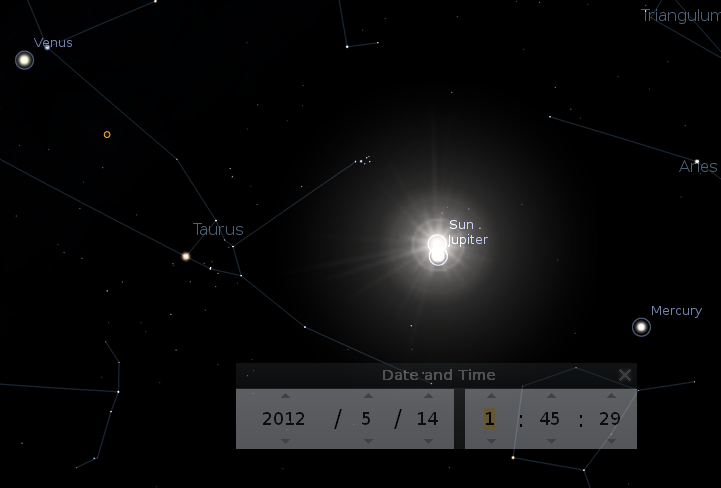
For my alignment of Jupiter, Earth and Sun have most influence on tectonic plates of all other alignments ..
Supermoons and group planetary alignments too ..
Earth will be between Sun and Jupiter on 29 October 2011, new supermoon on 26.October ..
Probably we have in ocean around 7.7 M ..
November is dangerous too but not like end of October ..

For 2012 year most dangerous time for tectonic plates movement are from Jupiter alignment to Venus transit and full supermoon from May 6 ..
From 1 May to 10 June 2012, think we have big volcano eruptions or very strong earthquake M 8.2+ very possible ..
May 6 3:34 356953 km ++ F- 0h
www.fourmilab.ch...
December of 2012 dangerous for 7.5 +, Earth is closes to Sun every year in end of December ..
Nov 14 10:23 357360 km - N+ 12h Nov 28 19:36 406364 km + F+ 4h
Dec 12 23:15 357073 km - N- 9h Dec 25 21:21 406099 km + F-2d13h

edit on 18-10-2011 by Dalke07 because: (no reason given)
Find some sad read today ..
Is very bad so little people take this possibly scenario seriously and this connections ..
Scientist are in silents all time, little effect this little effect that like some one sell my car ..
We all can learn very mach, we need to be smart and have open mind ..
"Will the March 19 'Supermoon' Trigger Natural Disasters?"
By Natalie Wolchover, Life's Little Mysteries Staff Writer
09 March 2011 3:07 PM ET
www.lifeslittlemysteries.com...
Is very bad so little people take this possibly scenario seriously and this connections ..
Scientist are in silents all time, little effect this little effect that like some one sell my car ..
We all can learn very mach, we need to be smart and have open mind ..
"Will the March 19 'Supermoon' Trigger Natural Disasters?"
By Natalie Wolchover, Life's Little Mysteries Staff Writer
09 March 2011 3:07 PM ET
On March 19, the moon will swing around Earth more closely than it has in the past 18 years, lighting up the night sky from just 221,567 miles (356,577 kilometers) away. On top of that, it will be full. And one astrologer believes it could inflict massive damage on the planet.
Richard Nolle, a noted astrologer who runs the website astropro.com, has famously termed the upcoming full moon at lunar perigee (the closest approach during its orbit) an "extreme supermoon." When the moon goes super-extreme, Nolle says, chaos will ensue: Huge storms, earthquakes, volcanoes and other natural disasters can be expected to wreak havoc on Earth. (It should be noted that astrology is not a real science, but merely makes connections between astronomical and mystical events.)
The effect of tides on seismic activity is greatest in subduction zones such as the Pacific Northwest, where one tectonic plate is sliding under another. William Wilcock, another seismologist at the University of Washington, explained: "When you have a low tide, there's less water, so the pressure on the seafloor is smaller. That pressure is clamping the fault together, so when it's not there, it makes it easier for the fault to slip."
www.lifeslittlemysteries.com...
edit on 19-10-2011 by Dalke07 because: (no reason given)
Dalke,.
the issue is, that SOOO many "predictions" fail
no matter how many scenarios you can put together,. it is still just a prediction.
and the failure percentage for predictions is VERY high. Nearly 100% the interest in taking this seriously just is not there.
But good luck to you anyway
the issue is, that SOOO many "predictions" fail
no matter how many scenarios you can put together,. it is still just a prediction.
and the failure percentage for predictions is VERY high. Nearly 100% the interest in taking this seriously just is not there.
But good luck to you anyway
On October 9th 2011, there was a Moon Halo phenomena. A Muslim religious scholar mentioned that a 'big disaster/event' shall happen, 44 days after
(plus minus). Come November 25th, 2011, there will be a partial lunar eclipse phenomena. I do not claim to know what is the correlation between this
and the claim made by the religious scholar, but we shall see. However, there are some interesting things to ponder on:
1. Before the Acheh tsunami, the same Moon Halo appeared.
2. The next day (before the actual tsunami), it was a long cloudy day.
3. Some isolated areas were experiencing quick sand phenomenon.
4. Waterfall current was stronger than usual.
5. Shellfish appeared near the beach.
6. Other weird sea creatures appeared as well, such as the Dugong.
If the same chronology (more or less) happens before November 25th, 2011, then there is probably a big chance that history will repeat itself. God knows best.
1. Before the Acheh tsunami, the same Moon Halo appeared.
2. The next day (before the actual tsunami), it was a long cloudy day.
3. Some isolated areas were experiencing quick sand phenomenon.
4. Waterfall current was stronger than usual.
5. Shellfish appeared near the beach.
6. Other weird sea creatures appeared as well, such as the Dugong.
If the same chronology (more or less) happens before November 25th, 2011, then there is probably a big chance that history will repeat itself. God knows best.
Originally posted by sHuRuLuNi
Thank you for posting another "prediction" which will undoubtedly fail.
G'day to you.
What an enlightening post..
So glad we have members like yourself who contribute in a meaningful, intelligent way on ATS..
Originally posted by gavron
Originally posted by oxbow
The Japan earthquake occurred on 11 March. The supermoon was on 19 March. There is no correlation between supermoons and large earthquakes.
I think you hit the nail right on the head. There is no correlation.
o0 ..
Hahahaa ..
Is good to have here members like you 2, we can learn a lo00t from you two ..
edit on 20-10-2011 by Dalke07 because: (no reason given)
Some stronger magma - tectonic plates activity what we have this days ..
Strong Hawaii earthquake swarm very close to volcano ..
MAP 2.2 2011/10/20 13:13:36 19.875 -155.539 17.5 21 km ( 13 mi) SE of Waimea, HI
MAP 2.1 2011/10/20 12:56:53 19.876 -155.546 16.7 21 km ( 13 mi) SE of Waimea, HI
MAP 2.2 2011/10/20 10:50:01 19.859 -155.550 13.9 22 km ( 14 mi) SE of Waimea, HI
MAP 2.5 2011/10/20 10:05:28 19.881 -155.544 17.8 21 km ( 13 mi) SE of Waimea, HI
MAP 2.1 2011/10/20 09:55:07 19.881 -155.542 17.2 21 km ( 13 mi) SE of Waimea, HI
MAP 3.4 2011/10/20 09:42:06 19.860 -155.539 15.3 23 km ( 14 mi) SE of Waimea, HI
MAP 2.8 2011/10/20 09:32:11 19.880 -155.542 16.4 21 km ( 13 mi) SE of Waimea, HI
MAP 2.4 2011/10/20 08:08:39 19.872 -155.542 17.3 22 km ( 13 mi) SE of Waimea, HI
MAP 2.2 2011/10/20 06:39:45 19.883 -155.542 18.1 21 km ( 13 mi) SE of Waimea, HI
MAP 2.1 2011/10/20 06:15:40 19.876 -155.546 17.4 21 km ( 13 mi) SE of Waimea, HI
MAP 2.6 2011/10/20 06:04:29 19.887 -155.544 16.6 20 km ( 13 mi) SE of Waimea, HI
MAP 2.4 2011/10/20 04:42:08 19.884 -155.542 17.7 21 km ( 13 mi) SE of Waimea, HI
MAP 2.0 2011/10/20 04:33:29 19.325 -155.124 5.9 16 km ( 10 mi) S of Fern Forest, HI
MAP 1.9 2011/10/20 04:32:04 19.883 -155.541 19.2 21 km ( 13 mi) SE of Waimea, HI
MAP 3.7 2011/10/20 04:17:33 19.304 -155.225 9.9 16 km ( 10 mi) S of Volcano, HI
MAP 2.2 2011/10/20 04:12:08 19.875 -155.539 16.6 22 km ( 13 mi) SE of Waimea, HI
MAP 2.5 2011/10/20 03:21:26 19.871 -155.549 14.3 21 km ( 13 mi) SE of Waimea, HI
MAP 2.7 2011/10/20 03:16:08 19.881 -155.546 19.3 21 km ( 13 mi) SE of Waimea, HI
MAP 2.3 2011/10/20 01:29:13 19.881 -155.547 17.0 21 km ( 13 mi) SE of Waimea, HI
MAP 2.5 2011/10/20 01:24:05 19.875 -155.537 17.9 22 km ( 13 mi) SE of Waimea, HI
MAP 2.1 2011/10/20 01:22:20 19.890 -155.545 17.6 20 km ( 12 mi) SE of Waimea, HI
MAP 1.3 2011/10/20 01:12:55 34.033 -116.950 18.8 9 km ( 6 mi) E of Yucaipa, CA
MAP 2.7 2011/10/20 01:11:01 19.863 -155.533 17.0 23 km ( 14 mi) SE of Waimea, HI
MAP 2.1 2011/10/20 01:04:37 19.880 -155.545 18.0 21 km ( 13 mi) SE of Waimea, HI
MAP 3.3 2011/10/20 00:59:00 19.884 -155.539 19.5 21 km ( 13 mi) SE of Waimea, HI
MAP 2.1 2011/10/20 00:57:49 64.632 -149.353 16.3 12 km ( 7 mi) WNW of Four Mile Road, AK
MAP 2.4 2011/10/20 00:57:03 19.855 -155.542 14.8 23 km ( 14 mi) SE of Waimea, HI
MAP 2.6 2011/10/20 00:48:01 19.881 -155.541 16.7 21 km ( 13 mi) SE of Waimea, HI
MAP 2.4 2011/10/20 00:45:56 19.845 -155.546 14.7 24 km ( 15 mi) SE of Waimea, HI
MAP 2.8 2011/10/20 00:45:17 19.879 -155.545 15.2 21 km ( 13 mi) SE of Waimea, HI
MAP 2.1 2011/10/20 00:40:37 38.360 -118.145 7.3 11 km ( 7 mi) NNW of Tonopah Junction, NV
MAP 2.0 2011/10/20 00:37:29 35.217 -118.665 6.4 6 km ( 3 mi) NNW of Bear Valley Springs, CA
MAP 2.1 2011/10/20 00:33:40 19.886 -155.548 18.1 20 km ( 12 mi) SE of Waimea, HI
MAP 1.7 2011/10/20 00:31:52 19.858 -155.527 16.2 24 km ( 15 mi) SE of Waimea, HI
MAP 2.0 2011/10/20 00:30:47 19.838 -155.408 16.7 23 km ( 14 mi) S of Paauilo, HI
MAP 2.5 2011/10/20 00:27:44 19.878 -155.536 18.6 21 km ( 13 mi) SE of Waimea, HI
MAP 2.4 2011/10/20 00:25:25 19.874 -155.547 16.3 21 km ( 13 mi) SE of Waimea, HI
MAP 3.1 2011/10/20 00:21:04 19.871 -155.543 15.7 22 km ( 13 mi) SE of Waimea, HI
MAP 2.4 2011/10/20 00:19:18 17.882 -66.883 18.2 11 km ( 7 mi) S of Mar�a Antonia, PR
MAP 2.0 2011/10/20 00:18:11 19.865 -155.522 16.9 24 km ( 15 mi) SE of Waimea, HI
MAP 1.0 2011/10/20 00:16:19 38.740 -122.716 6.7 4 km ( 3 mi) SSW of Anderson Springs, CA
MAP 1.9 2011/10/20 00:16:15 19.883 -155.541 17.8 21 km ( 13 mi) SE of Waimea, HI
MAP 3.6 2011/10/20 00:12:34 19.882 -155.533 16.6 21 km ( 13 mi) SE of Waimea, HI
MAP 1.8 2011/10/20 00:10:45 32.657 -115.958 8.2 10 km ( 6 mi) SSE of Ocotillo, CA
MAP 4.5 2011/10/20 00:10:04 19.886 -155.533 18.7 21 km ( 13 mi) SE of Waimea, HI
MAP 1.5 2011/10/19 23:49:35 64.650 -149.365 16.5 13 km ( 8 mi) WNW of Four Mile Road, AK
MAP 3.5 2011/10/19 23:42:27 64.679 -149.344 17.6 14 km ( 9 mi) NW of Four Mile Road, AK
MAP 1.0 2011/10/19 23:39:53 33.789 -116.105 3.4 14 km ( 9 mi) NNE of Coachella, CA
MAP 3.2 2011/10/19 23:36:12 37.539 -118.865 9.1 15 km ( 9 mi) SE of Mammoth Lakes, CA
The map below shows the current position of the Sun and the Moon
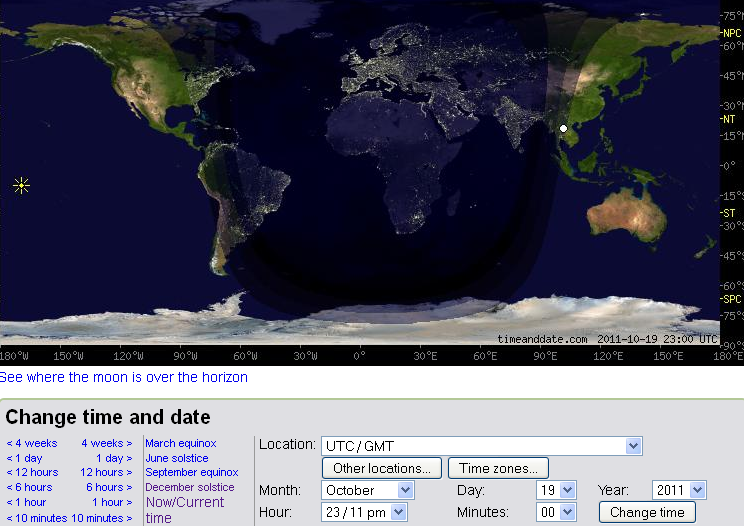
Strong Hawaii earthquake swarm very close to volcano ..
MAP 2.2 2011/10/20 13:13:36 19.875 -155.539 17.5 21 km ( 13 mi) SE of Waimea, HI
MAP 2.1 2011/10/20 12:56:53 19.876 -155.546 16.7 21 km ( 13 mi) SE of Waimea, HI
MAP 2.2 2011/10/20 10:50:01 19.859 -155.550 13.9 22 km ( 14 mi) SE of Waimea, HI
MAP 2.5 2011/10/20 10:05:28 19.881 -155.544 17.8 21 km ( 13 mi) SE of Waimea, HI
MAP 2.1 2011/10/20 09:55:07 19.881 -155.542 17.2 21 km ( 13 mi) SE of Waimea, HI
MAP 3.4 2011/10/20 09:42:06 19.860 -155.539 15.3 23 km ( 14 mi) SE of Waimea, HI
MAP 2.8 2011/10/20 09:32:11 19.880 -155.542 16.4 21 km ( 13 mi) SE of Waimea, HI
MAP 2.4 2011/10/20 08:08:39 19.872 -155.542 17.3 22 km ( 13 mi) SE of Waimea, HI
MAP 2.2 2011/10/20 06:39:45 19.883 -155.542 18.1 21 km ( 13 mi) SE of Waimea, HI
MAP 2.1 2011/10/20 06:15:40 19.876 -155.546 17.4 21 km ( 13 mi) SE of Waimea, HI
MAP 2.6 2011/10/20 06:04:29 19.887 -155.544 16.6 20 km ( 13 mi) SE of Waimea, HI
MAP 2.4 2011/10/20 04:42:08 19.884 -155.542 17.7 21 km ( 13 mi) SE of Waimea, HI
MAP 2.0 2011/10/20 04:33:29 19.325 -155.124 5.9 16 km ( 10 mi) S of Fern Forest, HI
MAP 1.9 2011/10/20 04:32:04 19.883 -155.541 19.2 21 km ( 13 mi) SE of Waimea, HI
MAP 3.7 2011/10/20 04:17:33 19.304 -155.225 9.9 16 km ( 10 mi) S of Volcano, HI
MAP 2.2 2011/10/20 04:12:08 19.875 -155.539 16.6 22 km ( 13 mi) SE of Waimea, HI
MAP 2.5 2011/10/20 03:21:26 19.871 -155.549 14.3 21 km ( 13 mi) SE of Waimea, HI
MAP 2.7 2011/10/20 03:16:08 19.881 -155.546 19.3 21 km ( 13 mi) SE of Waimea, HI
MAP 2.3 2011/10/20 01:29:13 19.881 -155.547 17.0 21 km ( 13 mi) SE of Waimea, HI
MAP 2.5 2011/10/20 01:24:05 19.875 -155.537 17.9 22 km ( 13 mi) SE of Waimea, HI
MAP 2.1 2011/10/20 01:22:20 19.890 -155.545 17.6 20 km ( 12 mi) SE of Waimea, HI
MAP 1.3 2011/10/20 01:12:55 34.033 -116.950 18.8 9 km ( 6 mi) E of Yucaipa, CA
MAP 2.7 2011/10/20 01:11:01 19.863 -155.533 17.0 23 km ( 14 mi) SE of Waimea, HI
MAP 2.1 2011/10/20 01:04:37 19.880 -155.545 18.0 21 km ( 13 mi) SE of Waimea, HI
MAP 3.3 2011/10/20 00:59:00 19.884 -155.539 19.5 21 km ( 13 mi) SE of Waimea, HI
MAP 2.1 2011/10/20 00:57:49 64.632 -149.353 16.3 12 km ( 7 mi) WNW of Four Mile Road, AK
MAP 2.4 2011/10/20 00:57:03 19.855 -155.542 14.8 23 km ( 14 mi) SE of Waimea, HI
MAP 2.6 2011/10/20 00:48:01 19.881 -155.541 16.7 21 km ( 13 mi) SE of Waimea, HI
MAP 2.4 2011/10/20 00:45:56 19.845 -155.546 14.7 24 km ( 15 mi) SE of Waimea, HI
MAP 2.8 2011/10/20 00:45:17 19.879 -155.545 15.2 21 km ( 13 mi) SE of Waimea, HI
MAP 2.1 2011/10/20 00:40:37 38.360 -118.145 7.3 11 km ( 7 mi) NNW of Tonopah Junction, NV
MAP 2.0 2011/10/20 00:37:29 35.217 -118.665 6.4 6 km ( 3 mi) NNW of Bear Valley Springs, CA
MAP 2.1 2011/10/20 00:33:40 19.886 -155.548 18.1 20 km ( 12 mi) SE of Waimea, HI
MAP 1.7 2011/10/20 00:31:52 19.858 -155.527 16.2 24 km ( 15 mi) SE of Waimea, HI
MAP 2.0 2011/10/20 00:30:47 19.838 -155.408 16.7 23 km ( 14 mi) S of Paauilo, HI
MAP 2.5 2011/10/20 00:27:44 19.878 -155.536 18.6 21 km ( 13 mi) SE of Waimea, HI
MAP 2.4 2011/10/20 00:25:25 19.874 -155.547 16.3 21 km ( 13 mi) SE of Waimea, HI
MAP 3.1 2011/10/20 00:21:04 19.871 -155.543 15.7 22 km ( 13 mi) SE of Waimea, HI
MAP 2.4 2011/10/20 00:19:18 17.882 -66.883 18.2 11 km ( 7 mi) S of Mar�a Antonia, PR
MAP 2.0 2011/10/20 00:18:11 19.865 -155.522 16.9 24 km ( 15 mi) SE of Waimea, HI
MAP 1.0 2011/10/20 00:16:19 38.740 -122.716 6.7 4 km ( 3 mi) SSW of Anderson Springs, CA
MAP 1.9 2011/10/20 00:16:15 19.883 -155.541 17.8 21 km ( 13 mi) SE of Waimea, HI
MAP 3.6 2011/10/20 00:12:34 19.882 -155.533 16.6 21 km ( 13 mi) SE of Waimea, HI
MAP 1.8 2011/10/20 00:10:45 32.657 -115.958 8.2 10 km ( 6 mi) SSE of Ocotillo, CA
MAP 4.5 2011/10/20 00:10:04 19.886 -155.533 18.7 21 km ( 13 mi) SE of Waimea, HI
MAP 1.5 2011/10/19 23:49:35 64.650 -149.365 16.5 13 km ( 8 mi) WNW of Four Mile Road, AK
MAP 3.5 2011/10/19 23:42:27 64.679 -149.344 17.6 14 km ( 9 mi) NW of Four Mile Road, AK
MAP 1.0 2011/10/19 23:39:53 33.789 -116.105 3.4 14 km ( 9 mi) NNE of Coachella, CA
MAP 3.2 2011/10/19 23:36:12 37.539 -118.865 9.1 15 km ( 9 mi) SE of Mammoth Lakes, CA
The map below shows the current position of the Sun and the Moon

reply to post by Dalke07
you dalke...i almost hope that there is some huge EQ around the 26th. seriously. you have been putting an aweful ot of thought and energy into keeping this going man!
you dalke...i almost hope that there is some huge EQ around the 26th. seriously. you have been putting an aweful ot of thought and energy into keeping this going man!
new topics
-
Trump sues media outlets -- 10 Billion Dollar lawsuit
US Political Madness: 51 minutes ago -
Fired fema employee speaks.
US Political Madness: 1 hours ago -
How long till it starts
US Political Madness: 2 hours ago -
USSS Agent Fired for Having Sex In Michelle Obama's Bathroom
US Political Madness: 4 hours ago -
Watching TV
Jokes, Puns, & Pranks: 6 hours ago
top topics
-
RFK is Trumps health pick
2024 Elections: 15 hours ago, 20 flags -
How long till it starts
US Political Madness: 2 hours ago, 8 flags -
Fired fema employee speaks.
US Political Madness: 1 hours ago, 8 flags -
USSS Agent Fired for Having Sex In Michelle Obama's Bathroom
US Political Madness: 4 hours ago, 7 flags -
Watching TV
Jokes, Puns, & Pranks: 6 hours ago, 6 flags -
Trump sues media outlets -- 10 Billion Dollar lawsuit
US Political Madness: 51 minutes ago, 6 flags
active topics
-
-@TH3WH17ERABB17- -Q- ---TIME TO SHOW THE WORLD--- -Part- --44--
Dissecting Disinformation • 3272 • : Thoughtful3 -
President-Elect DONALD TRUMP's 2nd-Term Administration Takes Shape.
Political Ideology • 196 • : WeMustCare -
The Reactionary Conspiracy 13. The plot’s theology.
General Conspiracies • 300 • : Oldcarpy2 -
USSS Agent Fired for Having Sex In Michelle Obama's Bathroom
US Political Madness • 22 • : CarlLaFong -
On Nov. 5th 2024 - AMERICANS Prevented the Complete Destruction of America from Within.
2024 Elections • 154 • : WeMustCare -
The art of being offended
Social Issues and Civil Unrest • 47 • : Oldcarpy2 -
How long till it starts
US Political Madness • 2 • : Cre8chaos79 -
The Trump effect 6 days after 2024 election
2024 Elections • 121 • : cherokeetroy -
Fired fema employee speaks.
US Political Madness • 5 • : Astrocometus -
Trump sues media outlets -- 10 Billion Dollar lawsuit
US Political Madness • 2 • : Coelacanth55
